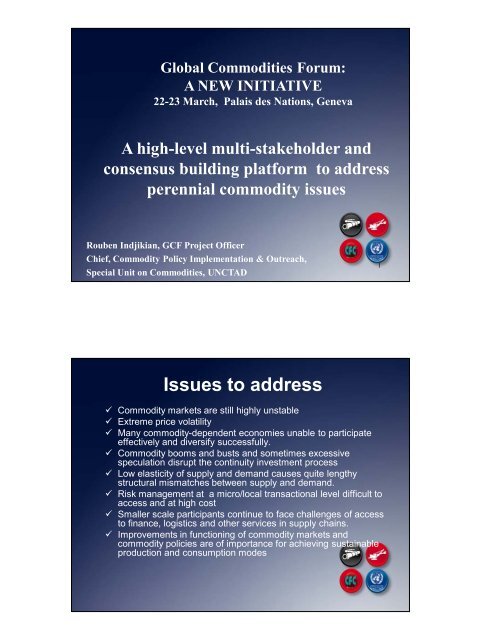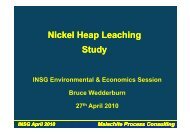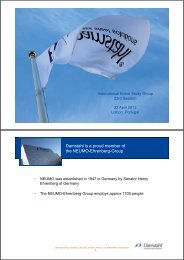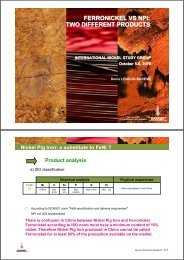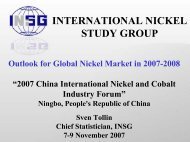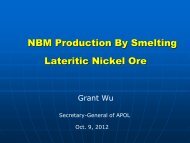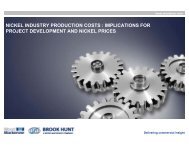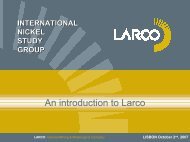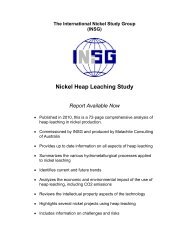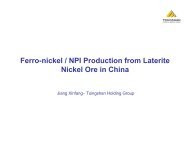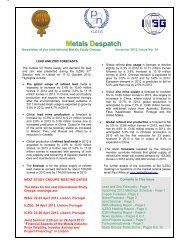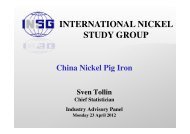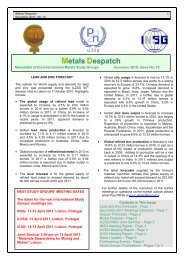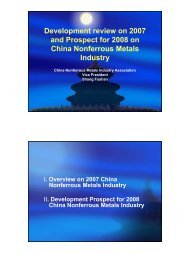Issues to address - International Nickel Study Group
Issues to address - International Nickel Study Group
Issues to address - International Nickel Study Group
Create successful ePaper yourself
Turn your PDF publications into a flip-book with our unique Google optimized e-Paper software.
Global Commodities Forum:<br />
A NEW INITIATIVE<br />
22-23 March, Palais des Nations, Geneva<br />
A high-level multi-stakeholder and<br />
consensus building platform <strong>to</strong> <strong>address</strong><br />
perennial commodity issues<br />
Rouben Indjikian, GCF Project Officer<br />
Chief, Commodity Policy Implementation & Outreach,<br />
Special Unit on Commodities, UNCTAD<br />
1<br />
<strong>Issues</strong> <strong>to</strong> <strong>address</strong><br />
Commodity markets are still highly unstable<br />
Extreme price volatility<br />
Many commodity-dependent economies unable <strong>to</strong> participate<br />
effectively and diversify successfully.<br />
Commodity booms and busts and sometimes excessive<br />
speculation disrupt the continuity investment process<br />
Low elasticity of supply and demand causes quite lengthy<br />
structural mismatches between supply and demand.<br />
Risk management at a micro/local transactional level difficult <strong>to</strong><br />
access and at high cost<br />
Smaller scale participants continue <strong>to</strong> face challenges of access<br />
<strong>to</strong> finance, logistics and other services in supply chains.<br />
Improvements in functioning of commodity markets and<br />
commodity policies are of importance for achieving sustainable<br />
production and consumption modes
GCF: a multi-stakeholder approach<br />
• His<strong>to</strong>ry shows that attempts <strong>to</strong> <strong>address</strong><br />
commodity problems only through intergovernmental<br />
negotiations is not enough<br />
• Intervention has in the past created challenges<br />
• GCF is becoming a neutral platform bringing<br />
<strong>to</strong>gether key stakeholders<br />
• Only a dialogue between ALL stakeholders<br />
may enable moves <strong>to</strong>wards an optimal balance<br />
between market practices and regulation.<br />
The Structure of GCF<br />
• The first GCF meeting focused on extractive<br />
industries – oil, gas and metals markets<br />
• Plenary and parallel sessions focused on market<br />
instability/price volatility, developing sustainable<br />
supply capacity and making commodities an<br />
“Ëngine for Growth”<br />
• Plenaries tended <strong>to</strong> be policy focused and the parallel<br />
sessions are more market orientated<br />
• Structure envisages GCF in future as not just a<br />
meeting event but also an information portal. We<br />
plan <strong>to</strong> develop a GCF eForum website<br />
<strong>to</strong> distribute UNCTAD analytical materials<br />
(issues for discussion, specialized<br />
journals and publications)
Who came <strong>to</strong> GCF<br />
• Governments: High level officials including speakers<br />
of ministerial level from Ecuador, UAE, Switzerland,<br />
Qatar, South Africa.<br />
• <strong>International</strong> agencies including heads CFC,<br />
<strong>International</strong> <strong>Study</strong> <strong>Group</strong>s, deputy head of IEA,<br />
• Private sec<strong>to</strong>r – more than 40 banks including<br />
Deutsche Bank, HSBC, SMBC, BNP<br />
• Representative organisations such as the Berne<br />
Union<br />
• Commodity exchanges: CME <strong>Group</strong>, LME, Dubai<br />
Mercantile Exchange, MCE of Mumbai<br />
• Academics & others<br />
• Around 400 delegates participated<br />
What is the aim of GCF<br />
• Improving communications between key stakeholders<br />
• Creating platform <strong>to</strong> regain consultation initiative<br />
on key commodity issues<br />
• Improved information-sharing and transparency<br />
• Better understanding volatility and risk issues<br />
• Assessing mechanisms <strong>to</strong> better contribute <strong>to</strong> price<br />
discovery/transparency<br />
• Better information flows and possibility <strong>to</strong> measure<br />
the commodity economy<br />
• Improving access <strong>to</strong> finance and logistics<br />
• Combining better supply and s<strong>to</strong>ck management on<br />
mezzo level with risk management on micro-level<br />
• Searching optimal proportions between regula<strong>to</strong>ry<br />
frameworks and market mechanisms
Reaching all Stakeholders<br />
• Creating high-level neutral platform <strong>to</strong> bring<br />
all stakeholders of commodity economy<br />
<strong>to</strong>gether<br />
• Giving a possibility for regular networking<br />
between policy makers, business leaders,<br />
experts and academics and <strong>to</strong> find better<br />
solutions <strong>to</strong> existing problems of the<br />
commodity economy<br />
• Making GCF an important, serious and<br />
trusted platform for all key stakeholders.<br />
Thank you for your attention<br />
rouben.indjikian@unctad.org<br />
For more information see:<br />
www.unctad.org/commodities<br />
www.globalcommoditiesforum.org


